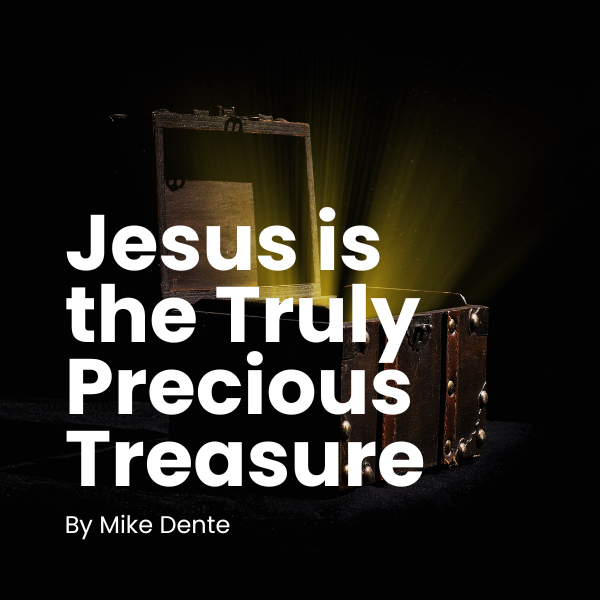
We all have our treasures, even pastors — those small things we hold dear. There are memories of seeing the Lord move, lives turned around, and sometimes it’s in our daydreams after a long day of work. Then there are the material things we can’t live without. I lived many years without a cell phone, and yet today, I can’t imagine not having one. Yet I’m not sure if I can say I treasure it. But if I were to describe a treasure, it would have to be what I saw one Sunday on the way back from church.
We were stuck on the Boulevard Périphérique in Paris, a 3-4 lane highway with a speed limit of 50km/h. As we crawled along, I noticed a Rolls-Royce in the next lane. However, the car was immaculate, as if it had driven out of a 1960s British movie. At first, the driver, with the same look of frustration as all of us, inspected his car. Later, for a moment when no one moved, he took out a cloth to rub some of the chrome around his window. Despite our closeness, we never met eyes, but I watched the smile of satisfaction that slid across his lips say everything…. We may have been stuck in traffic, but he was in his happy place.
Although a treasure can come in any packaging, Dallas Willard suggests that everyone has one; even the homeless carry with them what they love most in the world.[1] Even those who don’t consider themselves materialistic can discover hidden treasures within the corners of their heart. For some, it’s relationships that are so treasured that they become the top priority above all else, or they slip into a fusional state. For others, some excellent causes consume them and become a treasured ideal, such as nature preservation, social justice, or politics. Although these loves may not be visible while driving down the highway, they’re ever-present in conversation, in our daily lives, and they appear in our monthly bank statements. One can find pride in one’s prized love, one’s identity, or joy in nothing less.
Even the ministry or certain parts of it can become treasures—excellent study habits, a church building, a growing congregation, or the nostalgia of a golden era, or having suffered and come out stronger. How can we distinguish something we love and enjoy from a treasure? In a sermon on idolatry, Timothy Keller gave his listeners a test that can help them recognize when they’re in danger: daydreaming, spending more money and energy than we should, and, above all, anger rising in our hearts when our treasure is threatened.[2] Or as Jesus says: “Do not lay up for yourselves treasures on earth, where moth and rust destroy and where thieves break in and steal; but lay up for yourselves treasures in heaven, where neither moth nor rust destroys and where thieves do not break in and steal. For where your treasure is, there your heart will be also” (Matthew 6:19-21).
Heavenly treasures are different in nature. Like Joachim Jeremias[3] observed, every thought in the Sermon on the Mount is based on what was said before it. Before Jesus began talking about laying up treasures on earth, He strategically taught about prayer and fasting. The connection is our relationship with God and His kingdom. Prayer is our form of communication, but the treasure reveals the condition of the heart that prays and most likely the subject of our prayers, too. Seen this way, the heavenly treasure is “the manna from heaven,” received by meeting with the Father in the morning through prayer (Psalm 90:13).
The treasure of heaven thus begins with the King. He’s our greatest treasure. Jesus, who removed our shame by His Cross, welcomes us into His life. Then, He tells us of His Kingdom, of which the poor in spirit become heirs. What a radical change of perspective on what we own. Jesus as treasure means more than what we own; we are owned by Him. The thought of it is almost overwhelming when we consider how easily we can wander off in frustration at some trial or in admiration of some blessing. All the while, a treasure in heaven can be manifest in a conversation with a friend about Jesus for the first time, the joy of an answered prayer, or investing in a missionary work. It’s something that can never be taken away because it’s inscribed in eternity by the hand of the “Father of lights.”
This leads us to the power of our desires. Passion pushes couples to run away and get married in Vegas, to obsess on insults and pick each other apart. Our desires are mighty motivators, as James K.A. Smith[4] describes in his book Desiring the Kingdom. What we truly love, what we see as the good life, will lead us to our treasure, or at least what we imagine it to be. It’s a long-known secret in marketing, perfectly articulated in the TV series Mad Men. To sell a product, you must associate it with values or the good life imagined by people. To sell a carpet, we must appeal to the comfort of a warm, shoeless interior, and at all costs, avoid references to allergies and dog mess. The power of desire is enough to lead a whole life in pursuit of an ideal that one may not completely be able to describe, but in their heart, they know. This could lead to dark places if the desire isn’t a worthy one, and that’s why Jesus asks us to stop and consider what we desire. All our worldly treasures, even those we make of our ministry, will pass away with this world. This is why we need a better one.
Why is ministry a terrible treasure? It’s a conduit through which the real treasure was meant to pour. It’s like our Rolls-Royce owner loving the road more than the vehicle. Ministry is neutral in its basic form, a service, although an honor when we consider whom we serve. But if it becomes our treasure, we become technicians maintaining our system that can be capricious. In service to people, we open ourselves up to their emotional reactions to what we do for them. The ministry pays some people with a good reputation and others with the fear of imprisonment or shame. The ministry doesn’t pray for us; Jesus does, and so do His people. In the end, ministry as a treasure in and of itself can leave us proud of our accomplishments if we’ve had a little luck, or for those who felt passed over, bitter resentment.
This is why Jesus is the most precious treasure. He can never be taken from us. He will never allow it. He’s too good, too loving, too strong. One of His qualities I admire the most is His patience with us, taking the time necessary, like a master painter, to color every inch of our lives in the perfect hues and shading, even if they represent periods of struggle to obtain the finished work that we can only see when He’s done. Jesus, as the most precious treasure, inspired Paul in prison to sincerely affirm that to live is Christ, but to die is gain (Philippians 1:21), and then write in service to the church (Philippians 1:24).
If Jesus is our treasure, our spiritual eyes see beauty in the cross and the good life in His kingdom. Those desires begin to motivate and transform us. Then, Jesus as our treasure may give us the detachment we need to enjoy those things we were once tempted to treasure, but now with a new freedom. It still amazes me that Jesus equips us with the power we need to fulfill His will, and He invests in correcting us and making us better. He fills our lives with the beauty of His presence that touches everything, even our trials. Jesus as our treasure brings a profound sense of satisfaction to our souls.
References
[1] Dallas Willard, The Divine Conspiracy, William Collins, London 1998, p. 225.
[2] It can be found here: https://youtu.be/hN9GyHKrpPI.
[3] Joachim Jeremias, Paroles de Jésus, Foi Vivante, Paris 1965, pp. 54-57.
[4] James K. A. Smith, Desiring the Kingdom (Cultural Liturgies): Worship, Worldview, and Cultural Formation. Kindle Edition. pp. 39-75.







